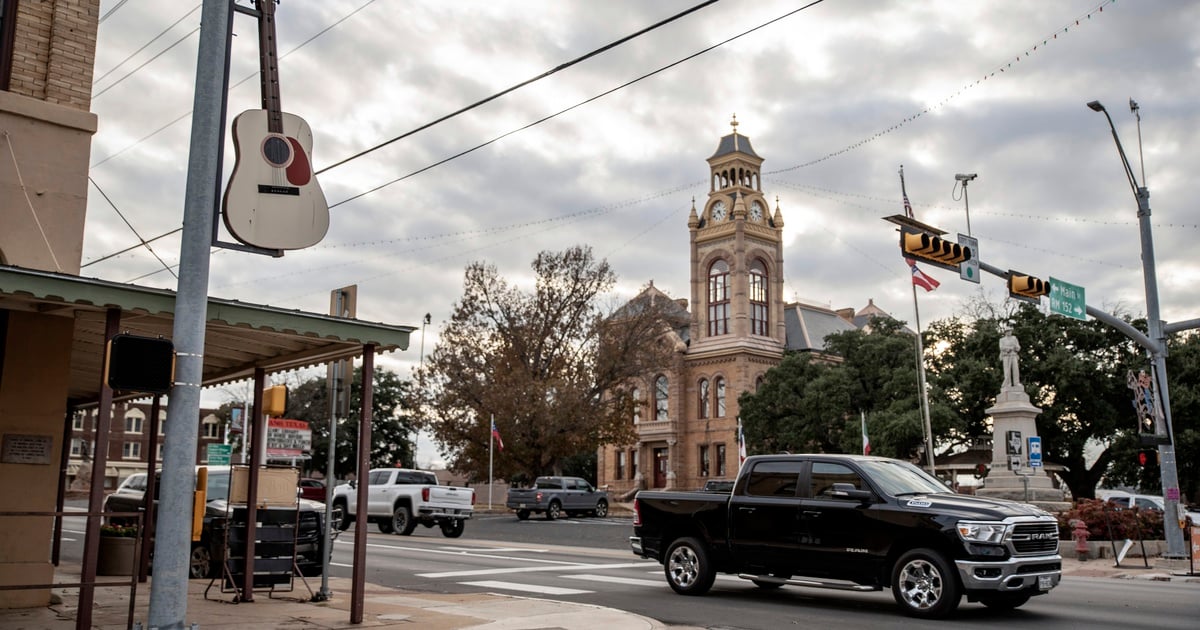Even in conservative corners of Texas, efforts to crack down on abortion travel are meeting resistance with some local officials who support Texas’s strict abortion laws, expressing concern that the efforts go too far.
LLANO, Texas — No one could remember the last time so many people packed into City Hall.
As the meeting began on a late August evening, residents spilled out into the hallway, the brim of one cowboy hat kissing the next, each person jostling for a look at the five city council members who would decide whether to make Llano the third city in Texas to outlaw what some antiabortion activists call “abortion trafficking.”
For well over an hour, the people of Llano — a town of about 3,400 deep in Texas Hill Country — approached the podium to speak out against abortion. While the procedure was now illegal across Texas, people were still driving women on Llano roads to reach abortion clinics in other states, the residents had been told. They said their city had a responsibility to “fight the murders.”
The cheers after each speech grew louder as the crowd readied for the vote. Then one woman on the council spoke up.
“I feel like there’s a lot more to discuss about this,” said Laura Almond, a staunch conservative who owns a consignment shop in the middle of town. “I have a ton of questions.”
More than a year after Roe v. Wade was overturned, many conservatives have grown frustrated by the number of people able to circumvent antiabortion laws — with some advocates grasping for even stricter measures they hope will fully eradicate abortion nationwide.
…
Isn’t it illegal to take a citizen of one state and say they aren’t allowed to do something legal in a different state? This is also just plain disgusting without the legality.
[Edit: Sorry, I was in a hurry and slaughtered this answer. I wanted to just give a reply in case no one else did, but bungled it. There’s detailed replies to the above answer the better spell out that they can’t regulate what someone does in a different state. I suggest reading the other responses to better understand this, and ignoring this one. I’ll leave it just so you can see how not to respond in a hurry.]
In general, it’s not illegal and is the basis behind the states rights movement.
It’s been an ongoing thing in the US, probably forever. I think Louisiana still had a legal drinking age of 18 until the mid-80s when they finally changed it to 21 – only because Reagan was going to withhold federal money from the state. People still have to drive to wet counties/states if they live in a dry one (eg. no alcohol can be sold).
There are some things where crossing the border and doing something can get you in trouble, like trafficking or reselling certain things.
I might be confused about what you’re saying.
In general, at the state level, you cannot prevent someone from going to another state even if you suspect they’re going to do something there that’s illegal in your state. Once you cross state lines, you’re subject to the laws of the state you’ve entered, and to federal law. Interstate crimes, like trafficking, fall under federal law, and that’s when the FBI gets involved. In addition, the drinking age policy was enforced, not by state law and not even by federal criminal law, but by the federal government passing a policy that restricts highway funding. Oklahoma could not criminalize traveling to Louisiana to drink “under age,” the feds had to get Louisiana to change their state law.
Texas can’t arrest you for flying to California to legally smoke weed. They can’t arrest you for going to Las Vegas to gamble. What they’re trying to do is make traveling while pregnant a trafficking type of crime such that existing the state while pregnant is a suspicious act.
The current SCOTUS has made some ridiculous rulings, so I wouldn’t want to gamble on this, but I honestly don’t think that it’s going to be more than political virtue signaling on an obviously unconstitutional law until the republicans take power at the federal level and pass a national anti-abortion law that permits federal agents to arrest patients and physicians in New York and California as well as having the sheriff do it in texas.
That’s effectively what I was trying to say, but in a hurry and with much less detail. Re-reading it, I guess I focused more that it’s legal for states to make their own laws (like this one) which wasn’t really the question the person was asking. But you’re right, they can’t punish you for things done in a different state, which I tried to touch on with the dry county & Louisiana topics and just dropped the ball.
Thanks for adding to this.
the states rights movement.
The pro-slavery movement?
I know it should be and I think it is. https://www.law.cornell.edu/wex/sherman_antitrust_act
Which is interesting given that the federal government also says that they claim extraterritorial jurisdiction on citizens abroad, so even if you do something in another country that’s legal, but illegal in the US, they could still prosecute you for it.
No, well, it depends. Let’s use weed as an example.
It’s illegal for a Colorado resident to smoke weed in Texas.
It’s legal for a Texas resident to smoke weed in Colorado.
It’s illegal for Texas to arrest a Colorado resident in Colorado for smoking weed in Colorado.
However, I believe it’s legal for Texas to make a law that’d allow them to arrest a Colorado resident in Texas for smoking weed in Colorado.
I think it’s also legal for Texas to make a law that’d allow them to arrest someone for travelling to Colorado with the intent to smoke weed (though that seems sketchy and might get thrown out on a constitutional basis).
So yes, afaik it’s legal for them to tell someone they aren’t allowed to travel through their town on the way to getting an abortion. However, the supreme court might take issue with it from a constitutional standpoint.
(On a side note, unless something changed recently, it’s still a felony in the US to transport weed across state lines, even if you’re travelling between two neighboring states with legal weed)
I think it’s also legal for Texas to make a law that’d allow them to arrest someone for travelling to Colorado with the intent to smoke weed
No, it’s not. The “commerce clause” in the Constitution gives Congress the power to regulate interstate commerce, not the states. States are separate legally. They can’t decide what other states do in their own territory, and they can’t pass laws restricting people traveling for that commerce.
If something is legal in one state and illegal in another, simply passing through a state to get to another literally can’t be restricted. This is the literal definition of the commerce clause, especially because healthcare in the US is a for-profit enterprise.
In fact, the healthcare facility could sue Texas in civil court for causing them damages by reducing their customers. It’s a direct harm to their business.
It’s legal for a Texas resident to smoke weed in Colorado.
This is what they asked (although not very clearly) and the answer as you said is yes.
I think it’s also legal for Texas to make a law that’d allow them to arrest someone for travelling to Colorado with the intent to smoke weed
It’s not. It’s literally unconstitutional. Even Kavanaugh got that part right.
In his concurring opinion in last year’s ruling overturning Roe, Supreme Court Justice Brett Kavanaugh contemplated whether states could restrict their residents from getting abortions in other states: “In my view, the answer is no based on the constitutional right to interstate travel,” he wrote.
What are they going to do, set up checkpoints?
With pregnancy tests, not breathalyzers.
“Ma’am, please step out of the car and pee on this strip.”
“Papers, please”
Look, another unenforceable law.
It’s only unenforceable if nobody unenforces it
Llano? The same Llano that tried to close its library because they weren’t allowed to remove books about gay people?
Do Federal dollars help build these roads? (I don’t know.)
If they are US routes or interstates then yes. If they are state or county/township roads than probably not. Though if I recall correctly if a local road has an over/underpass of an interstate federal funds could be used to help maintain or rebuild those bridges. That part I’m fuzzy on though so could be wrong.
That is really informative. Thank you!
Let them burn from climate change and also let them become their own country. Bye Texas






